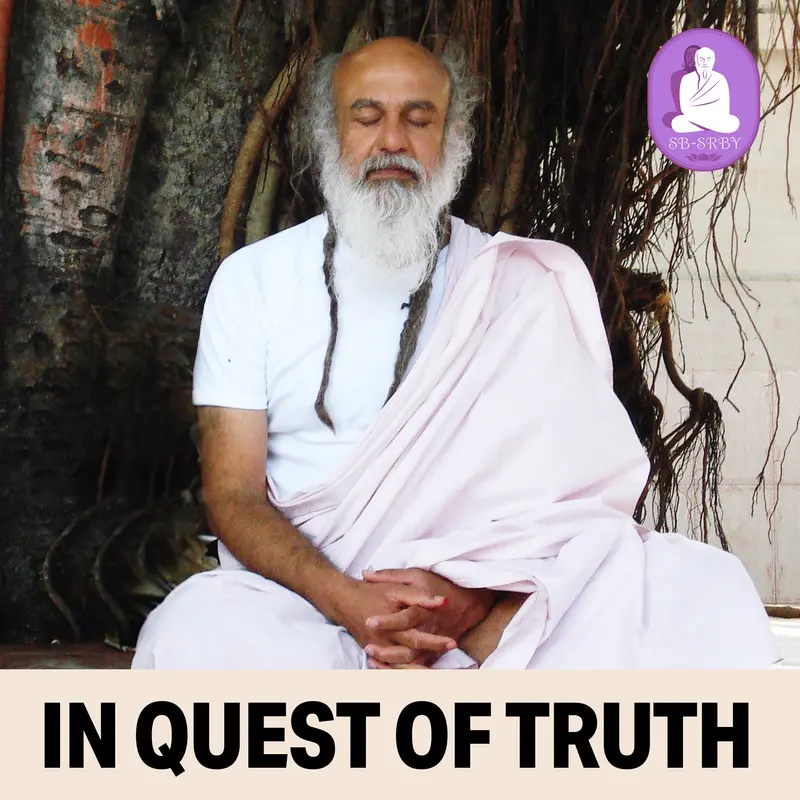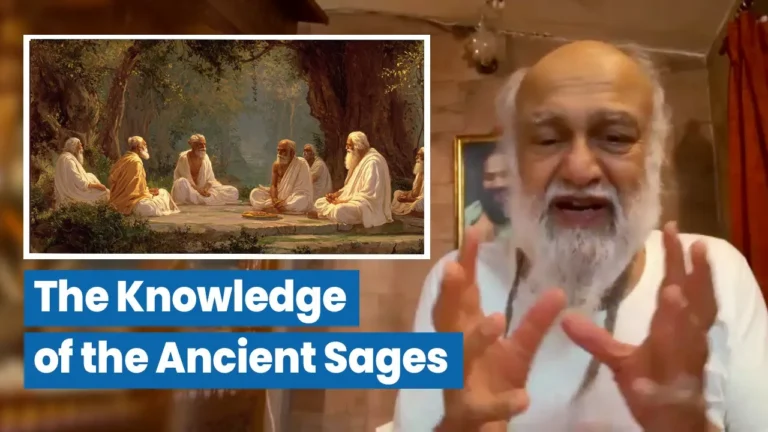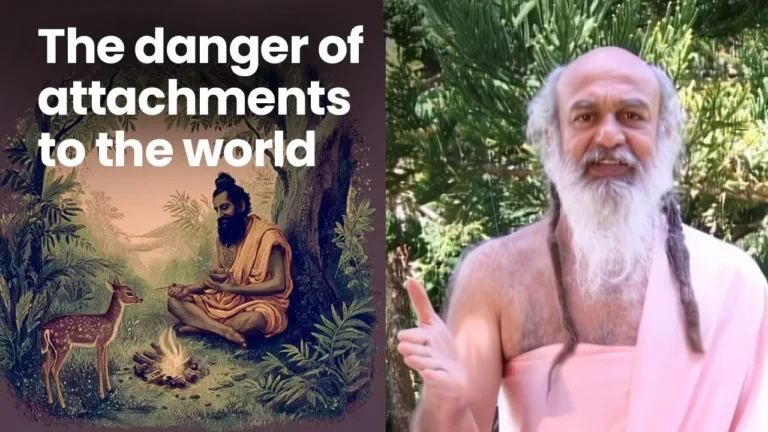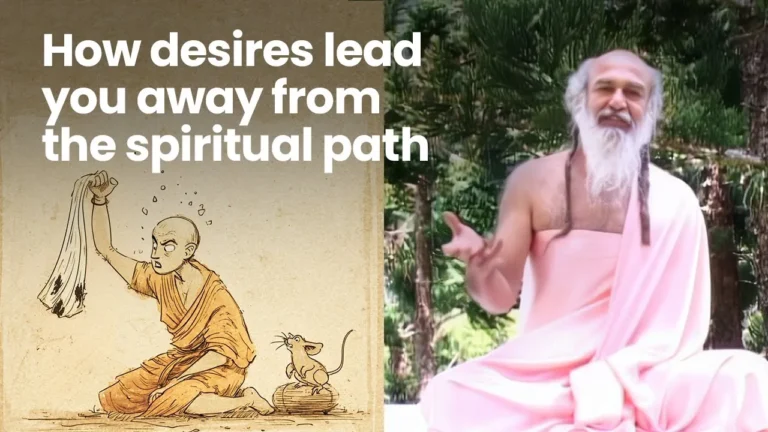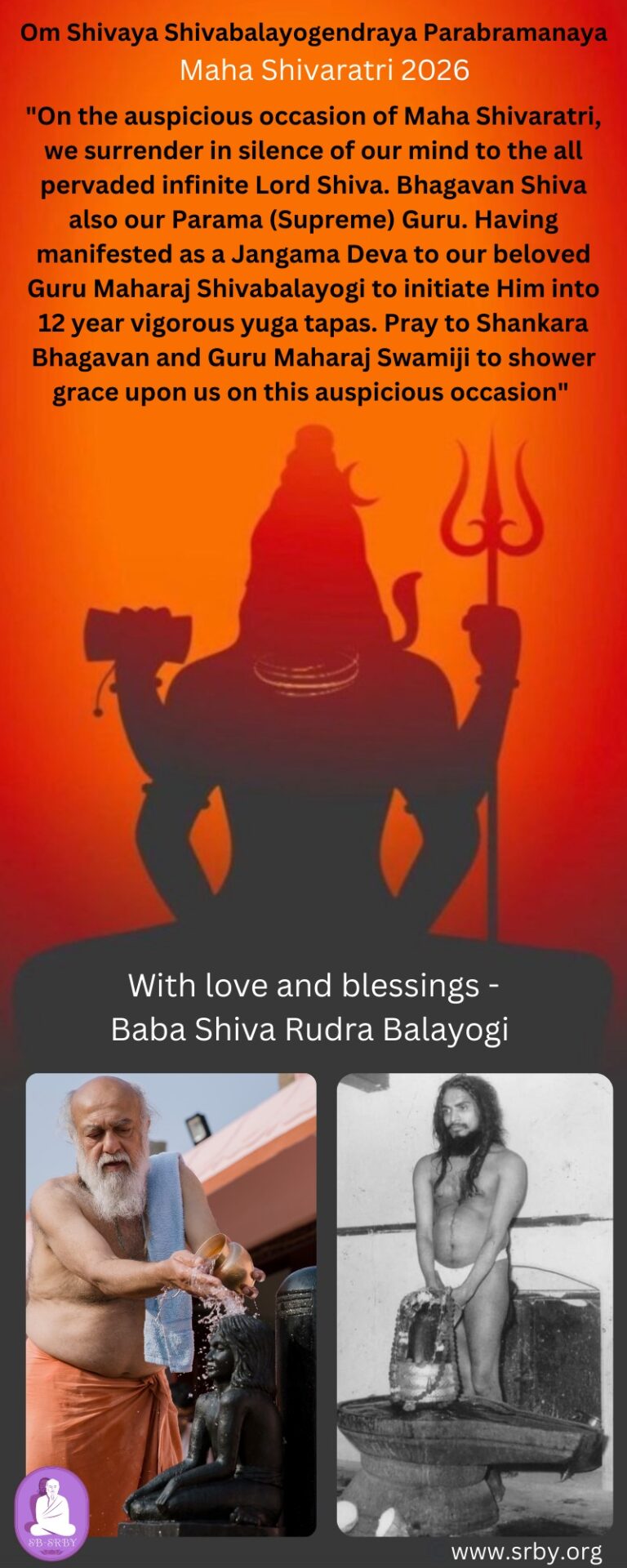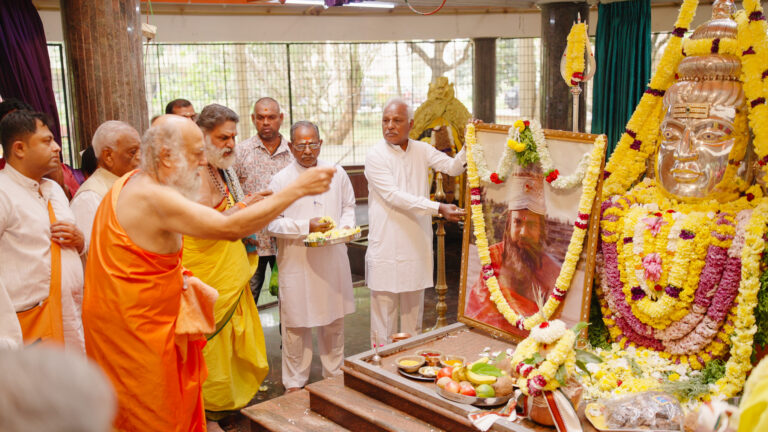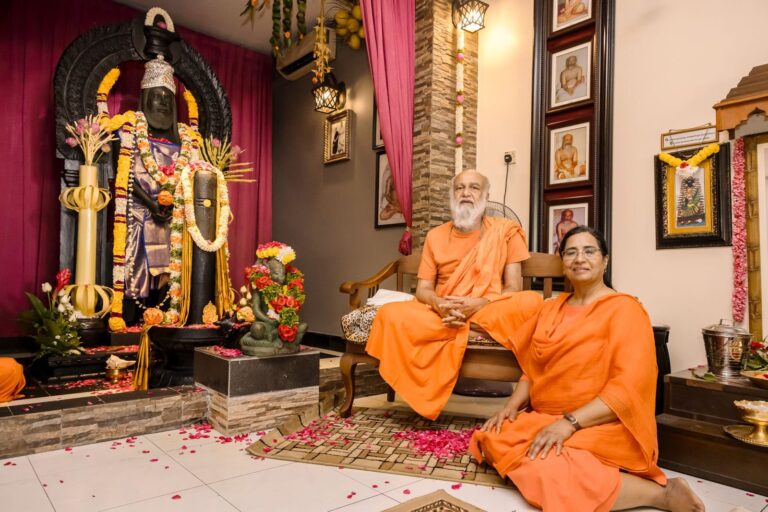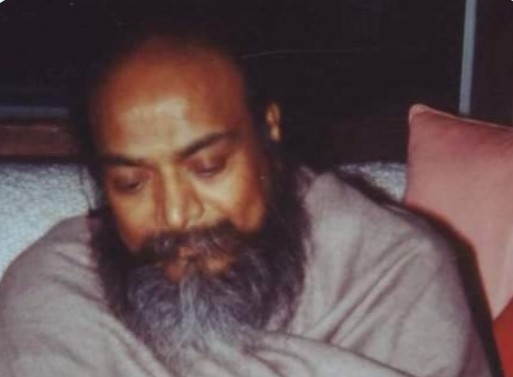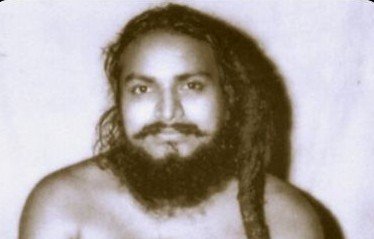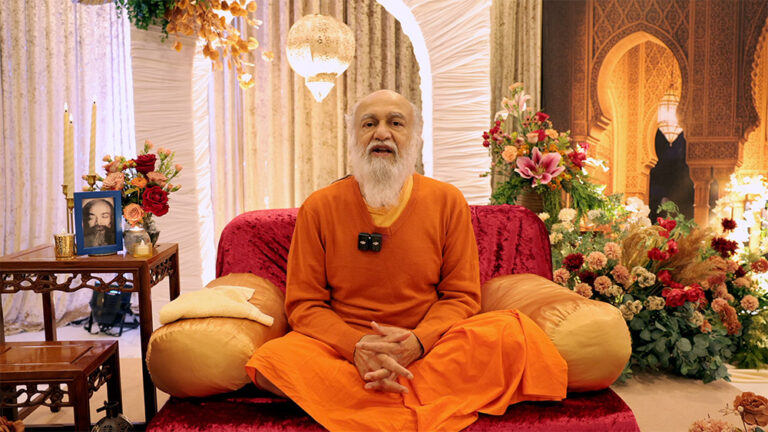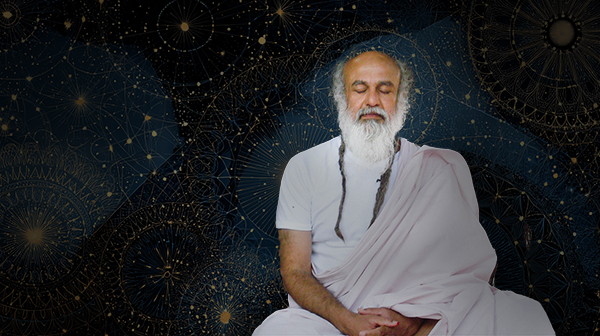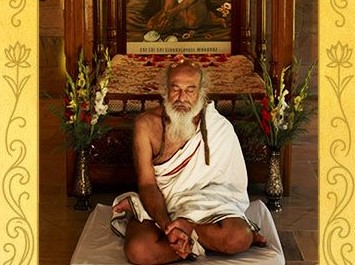Perth, Australia, 17 October 2007: Q&A – Part One
“The mind is effortlessly at all times settled into the Self, that is what being a ‘Yogi’ means. The mind would have abandoned all cravings and is settled effortlessly, naturally into the Self and is totally contented there, there are no desires.”
Question:

Baba, I noticed sometimes when you talk, it looks like you’re in shambhavi mudra (lit. state of supreme Shiva; it is a state of spontaneous or effortless meditation, in which the eyes become focused within and the mind delights in the inner Self without any attempt at concentration) – your attention is directed towards the Self. A lot of Yogis and siddhas, they seem to be in a natural state of shambhavi mudra and their attention is naturally on the Self, can you please comment on this?
Babaji:
Yes, in one place at the beginning sloka of Bramhananadam Paramasukhadam, it comes: ‘Tatvamasyaadhi Lakshyam,’ the Yogi’s attention is always on the Self. Though He can be talking, even as Ramana Mahashi puts, “A Yogi, even if He is gossiping also a lot, is ever the Silent one, because His mental attention is always on the Self only.” It has become one with It. It does not come out. It does not go into such cravings and such thoughts and worries all the time. Just like, if you observe your minds, all your minds would be constantly picturizing something and visualizing, dramatizing. It cannot keep quiet, even for a fraction of a second or a moment, whatever it is. But a Yogi’s mind has become totally silent. It does not picturize or visualize any such thing. It is Supreme Consciousness, and awareness of existence and Supreme Peace is always there, even if a Yogi is talking.
As I have also told, to deal with this world, a Yogi keeps His consciousness, what you all call it as ‘mind,’ only a little bit in touch with the brain, that is the minimum required. That is what happens, so that He can apply the brain and live in this world. Meaning, when He lives, it shall be useful to the others in this world only, because He doesn’t have anything of His own life, no desires, everything completely finished, totally satisfied. He doesn’t need anything actually, but He keeps His body by the Divine ordainment, for sake of others in this world, so thus His attention is always on the Self and the mind is totally quiet. It does not absorb any imprints also. Just like you write on the paper and it gets erased instantly; in the same way.
But for an ordinary mind, in whatever you get involved, like you talk or you listen to something, you watch and your mind analyzes, then it makes a judgment, “This is mine, this is not mine, this is a microphone, this is wall, this is carpet,” like this, hundreds and thousands and millions, and in the process it absorbs imprints also. That is what sits in the subconscious state which needs to be cleansed and evaporated through meditation to make the mind pure consciousness and that is when it gets dissolved into the Self. So that’s how a Yogi’s attention is.
Question:
Babaji, when a Yogi sleeps, does He dream?
Babaji:
The dream might occur. It appears in the brain, because a dream is the brain’s production, because a little bit of consciousness is in touch. But that dream will be of a vague, blurred picture, and the mind is totally aware, it doesn’t take it as a reality, or an imprint. The consciousness is aware of the Self, even during the dream time also. It is a very peculiar state, very difficult to explain. You have to experience to believe it.
Question:
Babaji, does that mean for a Yogi during the waking, dreaming and deep sleep state…?
Babaji:
All the three are the same state for a Yogi. All the three do not have that solid strength of reality. Even this world also is like a vague dream, a blurry picture that is amusing for Him, that the mind does not get involved. So that is what happens.
Question:
So you are ever aware of the Self, you are a witness to those states, dreaming, sleeping, you are just a silent witness?
Babaji:
Yes, all the time. Sometimes, if you want to try, when you watch a movie on the TV, you try this one also. Try to become aware that you are simply sitting and watching and then watch a little bit and then try to become aware, then you will see that your mind will not be able to concentrate on the movie, then the seriousness of the movie also gets lost. It is a peculiar thing that happens.
Question:
Baba, can you comment on Sahaja Samadhi. Some siddhas say that it is the supreme Samadhi, the natural Samadhi.
Babaji:
Sahaja Samadhi, you see, once you achieve the Nirvikalpa Samadhi, the mind is effortlessly at all times settled into the Self, that is what being a ‘Yogi’ means. The mind would have abandoned all cravings and is settled effortlessly, naturally into the Self and is totally contented there, there are no desires. So after that, even if He comes out of Samadhi, even if He has opened His eyes, even if He is talking, moving, eating, behaving like any normal person, His Samadhi is effortless and natural. That is what is Sahaja Samadhi, He is always in that state. That doesn’t get disturbed. For an outside person a Yogi might also appear as a normal personality only. That is why even Vyasa, the great Veda Vyasa, who has written the Mahabharata, also recommends in his hymns that, “You should not go too close to a Yogi, a Master, because you are likely to misunderstand Him and you should not go too far from the Yogi also, as you are likely to be ignored or neglected, because a Yogi’s mind is always in Samadhi.” You need to maintain a middle distance and be in touch with the Master, ‘prick’ him if you have any doubts by asking questions, take the answers and practice such methods, adopt it yourself and achieve it.
Question:
Does a Yogi ever need to sleep? Does He get tired?
Babaji:
A Yogi does not sleep, it is the body which sleeps.
Question:
I have a feeling that your mention of yoga nidra is different from what Swami Rama refers to as yoga nidra. In two of his books he says that you should put your attention on 61 points of your body and that helps you remain aware whilst your body goes to sleep, where as you seem to refer to yoga nidra as the inability to remain aware whilst you sleep?
Babaji:
No, yoga nidra happens during the sadhana of Tapas. Yoga nidra does not happen afterwards. What yoga nidra is, described in ancient scriptures also, suppose you are doing an advanced meditation, suddenly you are likely to become unconscious. Your consciousness of existence, that is the awareness of existence, must always be maintained. That’s why you should not go into a sleep during meditation, we always recommend, because if you go to sleep you cannot catch hold of the mind. Mind gets kicked off the reflections of the brain because brain goes into a sleepy state. Very minimal activity would be there in the brain to give only a dream type of sequence. But you are unable to be conscious of what you are doing then. Only after you get up yourself that, “I was sleeping,” but still you were there, you did not vanish, but still you are unconscious. So this state, when it happens during advanced meditations is known as yoga nidra. During the practice of yoga, you go into a nidra state, sleepy state. So then the things do not progress, the mind stops there, it doesn’t get cleansed further. This is mentioned by the great Ramana Maharishi and also in the Yoga Vasistha.
Question:
So these 61 points that Swami Rama talks about, what does he refer to then?
Babaji:
So it may have its own significance, it might be his experience, or he uses certain terminologies to tell it in a different way.
Question:
Whilst you were doing your Tapas, you were living in this Ashram, people were looking after you, they were feeding you whilst you were in meditation. How could this be possible for the majority of us? When the time comes for us to do this, will the circumstances materialize for us?
Babaji:
The Divine will definitely bless, when you are sincere, when you are genuine, and when the time is ripe, it is the Divine’s blessings that He will send somebody to take care of the physical body. If the Divine has the ordainment that your body has submission to do it, it will definitely happen. You need to have that faith with the Divine.
Question:
You can be anywhere?
Babaji:
It can be anywhere, anybody.
Question:
Babaji, can you please give us a little bit of information as to the use of siddhis and to where and how they are used and are they are a natural consequence of…?
Babaji:
Siddhis; during sadhana it comes, but it should not be shown to anybody, it should not be used, because ultimately it is the Divine’s wishes and the Divine is taking care of the entire creation, because one Yogi should not use his mental resolution. If He uses the mental resolution, His mind comes out of the Divinity. He knows only God. He is always in the God. So whoever has that faith and devotion in such a Yogi and prays, it is due to the God’s grace that such miracles might automatically happen some time, but Yogi should not have any claim or any such thing. He won’t be using such siddhis.
Question:
Babaji, are you in Jivanmukti? Are you liberated already?
Babaji:
Yes, this status is know as the Jivanmukti. While the body is alive, when one is liberated, it is known as the Jivanmukti and finally when the physical body gets dropped, it is known as Videha mukti. This is described in Yoga Vasistha widely.
Question:
Do Jivanmukti’s have a choice to come back to the world or they don’t come back anymore?
Babaji:
It is their choice. If they want they will have to resolve and there won’t be any more Jivanmukta. Then they will resolve and that means they have an attachment to this world, they have an imagination of the body, they have an imagination of the birth and death, all these things crop up in the mind and the mind comes into existence and such a thing happens. There is no need for a Yogi to come back, He becomes one with the Divine.

